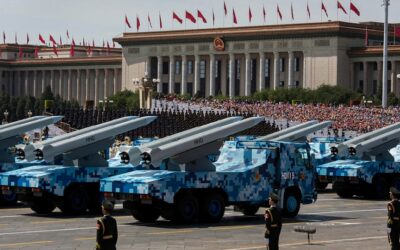
Ukraine’s Energy Minister: We are Moving Towards a Nuclear Accident
SUBSCRIBER+EXCLUSIVE INTERVIEW — Ukraine was hit by a fresh round of Russian missile attacks on Thursday, strikes that targeted and damaged the country’s power grid […] More

EXPERT PERSPECTIVE — The COP27 conference in late November put climate change back on the agenda. The summit ended with an historic agreement to establish a loss and damage fund to support countries already ravaged by the effects of climate change. However, there was little progress on other areas such as reducing emissions.
COP27 came after another year in the wake of climate disasters. From heatwaves in Europe to catastrophic flooding in Pakistan to the worst drought in the Horn of Africa in 40 years, climate disasters caused billions in damages and economic losses and killed thousands in 2022.
Beyond immediate human costs and physical destruction, climate change is set to exacerbate geopolitical tensions in various ways. Experts say displacement and food insecurity from climate disasters will magnify migration and refugee crises and political unrest. Climate-induced changes to the physical environment will open new points of conflict, such as with resource scarcity and the opening of new strategic waterways in the Arctic.
Recently, climate discussions have also begun to better acknowledge national security risks in the clean energy shift needed to combat climate change. Ongoing trade tensions and decoupling trends have exposed how current green energy supply chains can be dominated by adversaries, seen in the US solar industry’s reliance on Chinese solar panels and Beijing’s significant control of rare earths production.
BACKGROUND
THE EXPERTS
The Cipher Brief tapped Secretary General of the International Military Council on Climate Security and Senior Strategist at the Center for Climate and Security Sherri Goodman, Principal at KJM Analytics and former CIA Senior Executive Karen Monaghan and Co-Founder and Chairman of Silverado Policy Accelerator Maureen Hinman, who was also a presenter on the state of climate and national security risk at this year’s The Cipher Brief Threat Conference.
Sherri Goodman, Secretary General of the International Military Council on Climate Security, Senior Strategist, Center for Climate and Security

Sherri Goodman serves as Chair of the Board at the Council on Strategic Risks, whose Institutes include the Center on Climate & Security and the International Military Council on Climate Security. She is also Vice Chair, Secretary of State’s International Security Advisory Board, and Senior Fellow at the Woodrow Wilson International Center’s Polar Institute and Environmental Change and Security Program. She served as the first US Deputy Under Secretary of Defense for Environmental Security.
Karen Monaghan, Principal, KJM Analytics LLC

Karen Monaghan is a former senior executive with the CIA, where among her positions she served as the National Intelligence Officer for Economics. She has served as a consultant to Deloitte since 2018.
Maureen Hinman, Co-Founder and Chairman, Silverado Policy Accelerator

Maureen Hinman formerly served as Director for Environment and Natural Resources at the Office of the United States Trade Representative. She was also the US Department of Commerce’s senior industry trade specialist on international policy development and interagency advocacy for the US environmental technology industry.
Expert Perspective
The Cipher Brief: How are we doing in bringing sustainability to our security policies?
Monaghan: We’re making progress on green energy initiatives and climate change initiatives as a country, but I don’t think we’re any much different. I don’t think we’ve kind of melded the two. I think we understand the implications of climate change, extreme weather, but I don’t think it rises to the level of urgency that we might think it should. There’s a lot of talk about urgency if there’s some big hurricane or whatever, but then it kind of falls off the radar.
Climate change, pandemic, it’s an actorless threat, and it’s a lot harder to pin it on an enemy. That’s kind of how we still think in terms of national security. “Who’s the adversary?” I think we’re getting there, but I think we still have a ways to go.
Goodman: I’d say there’s a greater recognition of the security implications of climate change today than there was decades ago because lives and livelihoods are being lost on a daily basis. Societies like Pakistan are being destabilized with every increasing catastrophic flood event that mixes in with the other instabilities in society, in a weak governing system that already had inequities in food and water distribution, that’s nuclear armed, that’s subject to a lot of outside influences, taking advantage of vulnerable populations.
We now see that climate change is a threat multiplier in every region of the world and that it magnifies all the existing security threats we face. It makes things more complicated in this world of cascading and compound risks.
Hinman: We are starting to ask the right questions about what the inherent security risks are to shifting to a clean energy matrix. For a very long time, climate change security risk discussions have been limited to how changing weather and climatic events might act as an accelerant to existing global risks by increasing the likelihood of things like energy and water shortages or crop collapse. We are now pivoting toward the essential questions of the security risks posed by the transition and clean energy system. Those questions include: What are the systemic geopolitical risks of clean energy technologies? What are the acute technology and supply chain risks for clean energy? What are the systemic vulnerabilities of the clean energy economy? And finally, what types of alliances must we foster today to anticipate and short-circuit the risks of tomorrow?
The Cipher Brief: How has the Ukraine war impacted the shift to clean energy?
Monaghan: The Russian invasion of Ukraine on the one hand has raised issues about, or prompted some to say that this could accelerate a transition. Even the IEA said that. But I think a lot depends on what this winter looks like for Europe. I mean, already we’ve seen demand for coal increase. There have been public calls in a number of countries for more investments in fossil fuels to heat, and not so many calls for investments in sustainable energy, like solar power, for a variety of reasons. Even before the invasion last year, coal use globally was already surging to record levels. 80 percent of the world’s energy is still derived from fossil fuels. I think we have a long way to go. I think when you have something kinetic going on, that kind of rises much higher in the national security realm.
Goodman: Although there’s still some near term needs, there’s a pledge in the EU to go completely off Russian oil and to move off Russian gas as well and, at the same time, to accelerate the energy transition. So I think Putin’s energy strategy, if you have an energy strategy in this war, has backfired on him in the sense that the Russian economy is deeply dependent on its exports of oil and gas.
And at the same time, that posed a shock to Europe. If it’s a cold winter in Europe, there could be some hardship in terms of energy supplies. And European countries have asked their citizens to conserve and to be more energy efficient, which we all should. We always forget that efficiency is the fourth fuel in the process. Efficiency is always the cheapest fuel. The less you need, the more you have to do other things.
So I think ironically, Putin’s war has helped us to accelerate into the energy transition because now one can more clearly see the promise of electrification of vehicle fleets of cars, and we can more clearly see the promise of a distributed energy grid so that you’re not as vulnerable to attacks on a big centralized grid.
Hinman: Many have been operating on the false premise that the clean energy transition can be executed effectively with renewable energy sources alone. The Ukraine war and energy crisis have completely unraveled that notion. While it has been painful, and the human costs of this unconscionable war have been dear, ultimately, the lessons learned about the vulnerabilities in green energy transitions and systems may lead to a more effective and secure clean energy system in the long-term. These lessons include a renewed understanding of the necessity for clean baseload technologies, like nuclear reactors, and a better understanding of the risks of supply chain disruptions to energy systems. As ever, we need energy that is secure, sustainable, and resilient.
The Cipher Brief: China suspended climate talks with the US in August over US House Speaker Nancy Pelosi’s visit to Taiwan. The two sides later decided at COP27 to restart dialogues on climate. With this in mind, how does climate fit into US-China relations?
Monaghan: I think part of the reason the US was interested in restarting talks is not just because the need for China to address its emissions issue, but because so many of the other issues that we’re dealing with China on are so tense — trade issues, the whole chips and semiconductors issue, and tensions over Taiwan after a number of visits by political leaders in the US. I think both the US and China were looking for an avenue to be constructive on.
I’m not optimistic that they’re going to make a lot of progress. The fact that they’re actually going to continue to talk is progress, and is an important development. Again, I think part of it is to balance out some of the other really deep tensions, especially on semiconductors and the bans against Chinese technology in US manufacturing. It’s sort of almost at a state of war. We’re declaring war against the Chinese economy. So, let’s have a nice conversation about something that we can agree on that needs to be done.
Goodman: There are really three specific ways China could cooperate now that would make a difference. The first is China could join the global methane pledge, and that would help us tackle the most potent greenhouse gas.
Second, one of the other achievements or steps towards achievements at COP27 was some new creative ways of climate financing and recognizing that the way in which multilateral institutions like the World Bank and the IMF have typically granted loans for projects incurs too much debt. They’re rethinking about how to finance or to provide some loan forgiveness in that. China could be part of that and be part of promoting new creative ways of climate financing.
And then third is promoting global trade in green technologies. In the energy transition, the US and China stand to gain a lot economically from the energy transition, from the growth in renewables, and both economies have slightly different strengths in that. China has traditionally had more strength in manufacturing. The US has traditionally had more strength in entrepreneurship and innovation in the actual technology development. That will matter in making more technologies green and making renewable technologies available to a wider global market at a price that those who are still living in energy poverty can afford.
Hinman: I think the most important thing that the US can do to accelerate results from US-Sino climate talks is to develop a set of strategic economic policies to create incentives for China to meet its commitments under the Paris Accords and build ambition in the future. A Carbon Border Adjustment (CBA) policy in the United States could go a long way to create market incentives for China to decarbonize.
More critically, I think the United States needs to remain clear-eyed about the moral risks of trading away human rights to meet climate goals. Despite public pressure to provide an exception for solar panels, the Department of Homeland Security has been formidable in defending our values by continuing to halt solar imports from Xinjiang. The US cannot enter a meaningful climate dialogue from a position of strength if the CCP sees that we’re willing to trade our morals for cheap solar panels fabricated in concentration camps.
The Cipher Brief: What are some risks we face in building out green energy supply chains?
Goodman: In critical mineral supply chains — for things like cobalt, and lithium, and other rare earth minerals — China is one of the world’s major global producers of those minerals. The US and others are now trying to expand the places in which those minerals can be mined and accessed to friendlier countries from Australia, to Chile, to Canada. Even in the US, we’re looking at doing more mining. But it’s not just the mining, it’s the whole supply chain. It’s the processing, the extraction, and the various segments of the critical mineral supply chain that need to be knit together in a way that reduces the risks of any one point of it being too overly concentrated.
Monaghan: The raw materials needed for green energy projects are often found in parts of the world that are inhospitable. There’s a high concentration that are only in a few countries, many of whom are rivals, many of whom have been wooed, particularly by China, over the last decade. We’re playing catch up in the United States to start wooing these countries, and encouraging them to produce these raw materials and provide open access on the global market.
Let’s just take a mining company, for example, in the DRC. It may be a national mining company, but China does the development. China’s funding the extraction and/or the refining. It’s marketed through a global minerals trading company such as Glencore. It’s very concentrated in a few hands. Add onto that, in some of these countries you have active sort of civil war situations such as the DRC.
For all that we’re going to need to build in terms of batteries and whatever, it’s not that there’s not enough minerals. They’re actually in fewer hands than you would realize. I wouldn’t be surprised, for example, if we had an OPEC of green energy minerals, at some point. Countries and companies get together and form some kind of a cartel.
Ten years ago, we were all talking about the death of OPEC. Well, now it’s in some ways more powerful than ever. Ten, fifteen years ago, most people would’ve said, “Oh, OPEC’s a thing of the past” because of fracking in the United States. Things change. When you have tightness in the fossil fuel market, those who didn’t have as much power ten, fifteen years ago, all of a sudden emerge more powerful again.
Hinman: The most immediate issue with clean energy is where we are sourcing our technologies and upstream mineral supply chains.
Two critical security risks emerge here: First, we should be worried about sourcing energy and grid technologies from adversaries. I am always concerned about the potential for national champions or state-owned enterprises programming in kill switches to the energy critical technologies they sell us. Second, the increasing concentration of mineral processing and critical componentry to a single point of failure in the supply chain is an extreme risk we have been living with for some time.
For the past twenty years or so we were able to squeeze so much efficiency out of the global economy that we forgot to account for the risk of handing one party a critical node in the energy supply chain. The upside of recent supply chain disruptions is that everyone understands this now, but it will take time to turn this ship and diversify supply chains. I’m concerned whether we have enough runway to execute on this transition in time to deter conflict in East Asia in particular.
Cipher Brief writer Ethan Masucol contributed to this report.
Read more expert-driven national security insights, perspective and analysis in The Cipher Brief
Related Articles

SUBSCRIBER+EXCLUSIVE INTERVIEW — Ukraine was hit by a fresh round of Russian missile attacks on Thursday, strikes that targeted and damaged the country’s power grid […] More

SUBSCRIBER+ EXCLUSIVE REPORTING – In some ways, Wednesday’s House vote to ban or force the sale of the social media app TikTok was a landmark […] More

SUBSCRIBER+ EXCLUSIVE REPORTING – As drones of all types – aerial, land, and maritime – grow in number and sophistication, so do nightmarish scenarios about […] More

CIPHER BRIEF REPORTING — As a response to concerns about U.S. involvement in Chinese high-tech industries, President Biden this month signed an executive order that aims to […] More

NEED A GOOD BEACH READ? Things are heating up in the literary world this summer, so in case you’re headed to the beach or the […] More

CIPHER BRIEF REPORTING — Someone other than Vladimir Putin will likely be running Russia in as little as three years, says former CIA Director and […] More
Search